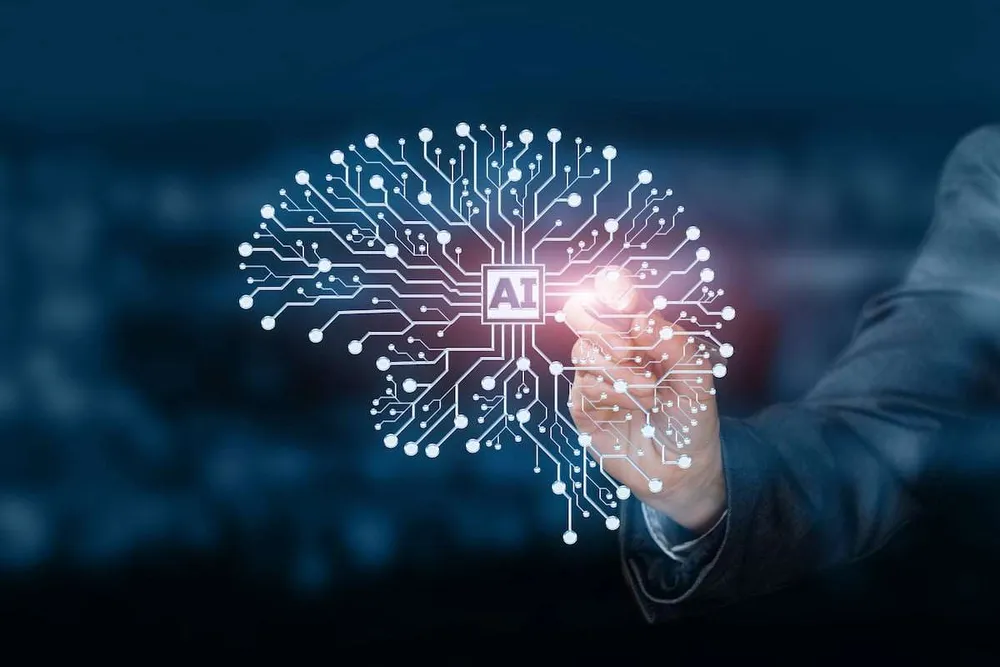AI Platform as a Service: Main Components and Applications

The development of AI platform as a service (AI PaaS) allows companies to access products offered by cloud service providers (CSP). Enterprises of all sizes no longer need to make significant investments to integrate AI-driven features enabling them to process large volumes of data, convert text to speech, detect objects in videos, or perform facial recognition on a scale. CSPs build edgy tools to facilitate using AI and machine learning (ML) technologies. In this guide, we will analyze the meaning of AI PaaS and consider its difference from AI as a service (AIaaS) to help ventures choose the best option for their needs.
What is AI Platform as a Service?
AI PaaS is an efficient approach that allows companies to leverage cloud technologies to achieve process automation. Reducing resource usage and diminishing expenses requires firms to utilize interfaces to access AI-driven tools and virtualization systems and scale processes automatically depending on current needs.
AI PaaS enables businesses to access ML and deep learning (DL) models while paying only for the resources they use and the features they need. Such solutions are especially useful for developers working on AI-driven apps, as they enable them to utilize AI without investing in costly cloud infrastructure.
Building a sustainable business necessitates scaling up operations on the go, which explains the effectiveness of the AI PaaS approach. Every team can quickly integrate such an end to end solution via APIs.

We are confident that we have what it takes to help you get your platform from the idea throughout design and development phases, all the way to successful deployment in a production environment!
AI PaaS Components
Innovative technologies enable ventures to process huge amounts of data without utilizing significant computing resources. CSPs allow their clients to access infrastructure and data processing resources at a fraction of the cost. It enables developers to build powerful AI systems and train large language models (LLMs) with ease. The key difference between AI PaaS and standard models lies in the fact that the former enables clients to use the following components:
- Pre-trained ML models: The usage of such tools requires a high level of technical expertise. Instead of building them from scratch, firms deploy existing solutions based on advanced ML algorithms. The models enable users to process images, recognize text and speech patterns, perform motion detection, and extract insights. They are also suitable for predictive modeling and other tasks.
- AI API: Cloud platforms utilize APIs to streamline communication with AI systems. Top providers offer a variety of solutions designed to process and analyze large datasets, make predictions, conduct semantic searches, and offer interpretation using NLP technology.
AI PaaS technology helps businesses quickly deploy chatbots and virtual assistants, translate content into multiple languages, and detect suspicious behaviors to minimize fraudulent activities.
Advantages of Using AI Platform as a Service
Ventures utilize AI PaaS solutions to optimize processes and minimize expenses. There are several upsides to ordering such products:
- Streamlined development: AI PaaS packages typically include handy tools and services enabling firms to build apps faster and more efficiently. It allows professionals to deploy and test ML models and focus on more complex components. Most CSPs use the pay-as-you-go approach, which enables companies to save money.
- Pre-built algorithms: Companies access infrastructure with in-built safety mechanisms. Using AL and ML algorithms, specialists build apps faster and automate maintenance processes.
- Impressive scalability: Businesses order AI PaaS solutions to optimize processes and see how they can benefit from integrating AI systems. This technology enables businesses to expand their presence quickly without creating new infrastructure or bloating staff.
- Useful insights: AI tools facilitate analyzing processes and discovering areas requiring improvement. They help organizations make informed decisions and achieve strategic goals. AI cloud services enable firms to collect valuable data, discover trends, and establish connections between datasets.
Ventures leverage such solutions to save valuable resources and utilize AI to expedite operations and increase process efficiency.
Challenges of Deploying AI PaaS
Even though AI platform as a service solutions have noticeable advantages, some organizations are wary of implementing them. Their integration and subsequent customization require dealing with common obstacles:
- Security issues: Maintaining compliance requires companies to take additional measures to ensure the safety of business data. The usage of cloud platforms necessitates focusing on data governance and privacy issues. By establishing clear policies and protocols, ventures stay compliant and reduce the possibility of data breaches. AI PaaS requires businesses to rely on an ICP’s security mechanisms.
- Data quality: Finding reliable sources of data in a suitable format can be arduous. Some organizations struggle with building large datasets and structuring the available information.
Discovering trustworthy data sources is the best way to ensure the seamless functioning of AI PaaS systems. Besides, it is essential to choose a reliable provider that strictly adheres to security standards.

Main AI PaaS Providers
Enterprises should analyze AI platform examples to decide on the best option for their needs. Major companies offer cloud computing services, allowing businesses to build advanced ML models even with limited resources. Here are the most popular CSPs:
- Amazon: AWS enables businesses to utilize an adjustable PaaS architecture and access pre-built features and microservices.
- IBM: Clients enjoy affordable AI solutions, enabling them to solve practical issues.
- Google: The corporation’s products are often used by professional developers and researchers interested in highly scalable infrastructure supporting impressive speed. Vertex AI is a top-level solution for building and launching AI models.
- Microsoft: Azure AI is a comprehensive solution for deploying and managing AI-powered products.
Other popular platforms include Deep Cognition, Dataiku, and DataRobot.
How to Choose an AI PaaS Service?
When looking for a CSP offering AI PaaS solutions, it’s crucial to consider whether these products can be tailored to a firm’s needs. Whether an enterprise specializes in software development or other areas, making the right choice requires focusing on such points:
- Dataset quality: Regardless of the provider, it’s crucial to invest money into building reliable datasets. It will ensure the seamless functioning of deployed AI solutions.
- Compatibility: Checking whether a specific AI PaaS utilizes tools, frameworks, and languages that facilitate the integration of AI-driven products with existing systems is necessary to expedite the implementation process.
- API support: Most providers allow clients to use APIs to integrate AI features with apps. It facilitates integrating AI tools.
Besides, it’s crucial to choose a reliable provider known for successful partnerships and projects. Making the right choice requires firms to analyze feedback and find the most suitable platform supporting modern technologies.
Real-World AI PaaS Applications
The deployment of machine learning models has transformed multiple industries and continues to impact the way businesses operate. AI PaaS technology helps organizations to reduce their expenditure. Such solutions are effectively deployed in various spheres:
- Customer support: Enterprises utilize AI PaaS to integrate chatbots and use advanced sentiment analysis solutions. Retail businesses deploy such systems to generate personalized recommendations based on in-depth analysis of client data and increase sales.
- Healthcare: AI-powered tools enable medical professionals to analyze patient records and other sources to expedite diagnostics, improve the quality of patient care, and optimize processes. Drug discovery tools let organizations reduce expenses. Using AI, it is possible to analyze huge volumes of data and develop result-yielding treatment programs.
- Finance: Banks and other organizations use AI PaaS to detect suspicious behaviors. Such tools automate trading operations and help enterprises analyze possible risks before making a decision. Companies process information to make fact-based decisions in changing environments. It allows banks to optimize credit scoring procedures and mitigate security threats.
- Manufacture: AI PaaS makes it easier to predict equipment failure by analyzing information collected by sensors. Such tools facilitate predictive maintenance and allow businesses to reduce downtime and achieve higher operational efficiency. It lets entities save less on repairs and extend equipment lifespan.
These use cases demonstrate the applicability of artificial intelligence services across different spheres and highlight their significance for various industries.
Why Choose AI PaaS over AIaaS?
AI PaaS and AIaaS are used in different situations, so the choice between them depends on a venture’s needs. The former is more suitable for businesses that need to access a well-developed infrastructure. Such solutions are typically more complex. However, a company needs to hire specialists to use software development kits (SDK). AIaaS products are best suited for small and medium-sized enterprises without dedicated development teams. Such off-the-shelf tools have many uses, but they are hardly suitable for complex projects that require advanced customization.
AI platform as a service is the best choice for ventures that need to utilize a safe environment to connect their operating systems and expedite development and deployment stages. Using them, firms migrate their on-premises apps to the cloud and scale operations as the number of their clients increases. However, integrating such solutions requires a high level of technical expertise, and many businesses entrust this task to third-party providers. The Global Cloud Team includes experienced professionals who assist businesses with building customized apps and expanding their operations using cloud platforms. Get in touch with our team today and discover how to leverage AI PaaS to deploy powerful apps without wasting resources.
Top Articles
What is Hyperautomation: A Comprehensive Overview of Key Components
I am here to help you!
Explore the possibility to hire a dedicated R&D team that helps your company to scale product development.






